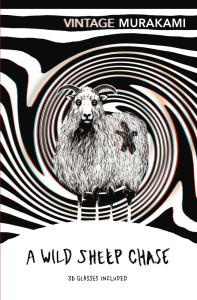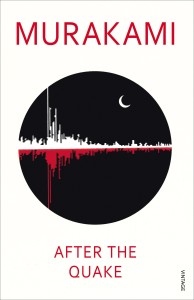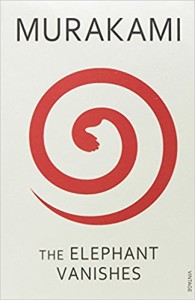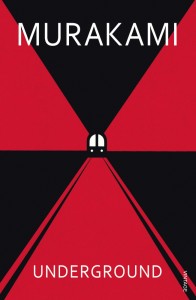
Born January 12, 1949 in Kyoto, Haruki Murakami won a prize for his first novel, Hear the Wind Sing (1979). His unusual style has been called “mysterious and surreal,” a postmodern departure from other contemporary Japanese literature. Murakami’s 1987 novel Norwegian Wood was a huge hit in Japan. Other titles include The Wind-Up Bird Chronicles (1995), Kafka on the Shore (2002) and 1Q84(2009).

Sumire is in love with a woman seventeen years her senior. But whereas Miu is glamorous and successful, Sumire is an aspiring writer who dresses in an oversized second-hand coat and heavy boots like a character in a Kerouac novel. Sumire spends hours on the phone talking to her best friend K about the big questions in life: what is sexual desire, and should she ever tell Miu how she feels for her? Meanwhile K wonders whether he should confess his own unrequited love for Sumire.

Kafka on the Shore follows the fortunes of two remarkable characters. Kafka Tamura runs away from home at fifteen, under the shadow of his father’s dark prophesy. The aging Nakata, tracker of lost cats, who never recovered from a bizarre childhood affliction, finds his pleasantly simplified life suddenly turned upside down. Their parallel odysseys are enriched throughout by vivid accomplices and mesmerising dramas. Cats converse with people; fish tumble from the sky; a ghostlike pimp deploys a Hegel-spouting girl of the night; a forest harbours soldiers apparently un-aged since WWII.

A young man accompanies his cousin to the hospital to check an unusual hearing complaint and recalls a story of a woman put to sleep by tiny flies crawling inside her ear; a mirror appears out of nowhere and a nightwatchman is unnerved as his reflection tries to take control of him; a couple’s relationship is unbalanced after dining exclusively on exquisite crab while on holiday; a man follows instructions on the back of a postcard to apply for a job, but an unknown password stands between him and his mysterious employer.

The midnight hour approaches in an almost empty all-night diner. Mari sips her coffee and glances up from a book as a young man, a musician, intrudes on her solitude. Both have missed the last train home. The musician has plans to rehearse with his jazz band all night, Mari is equally unconcerned and content to read, smoke and drink coffee until dawn. They realise they’ve been acquainted through Eri, Mari’s beautiful sister. The musician soon leaves with a promise to return before dawn.

When he hears her favourite Beatles song, Toru Watanabe recalls his first love Naoko, the girlfriend of his best friend Kizuki. Immediately he is transported back almost twenty years to his student days in Tokyo, adrift in a world of uneasy friendships, casual sex, passion, loss and desire – to a time when an impetuous young woman called Midori marches into his life and he has to choose between the future and the past.

The man was leading an aimless life, time passing, one big blank. His girlfriend has perfectly formed ears, ears with the power to bewitch, marvels of creation. The man receives a letter from a friend, enclosing a seemingly innocent photograph of sheep, and a request: place the photograph somewhere it will be seen. Then, one September afternoon, the phone rings, and the adventure begins. Welcome to the wild sheep chase.

For the characters in after the quake, the Kobe earthquake is an echo from a past they buried long ago. Satsuki has spent thirty years hating one man: did her desire for revenge cause the earthquake? Miyake left his family in Kobe to make midnight bonfires on a beach hundreds of miles away. Fourteen-year-old Sala has nightmares that the Earthquake Man is trying to stuff her inside a little box. Katagiri returns home to find a giant frog in his apartment on a mission to save Tokyo from a massive burrowing worm. ‘When he gets angry, he causes earthquakes,’ says Frog. ‘And right now he is very, very angry.

Growing up in the suburbs in post-war Japan, it seemed to Hajime that everyone but him had brothers and sisters. His sole companion was Shimamoto, also an only child. Together they spent long afternoons listening to her father’s record collection. But when his family moved away, the two lost touch. Now Hajime is in his thirties. After a decade of drifting he has found happiness with his loving wife and two daughters, and success running a jazz bar. Then Shimamoto reappears. She is beautiful, intense, enveloped in mystery. Hajime is catapulted into the past, putting at risk all he has in the present.

When a man’s favourite elephant vanishes, the balance of his whole life is subtly upset. A couple’s midnight hunger pangs drive them to hold up a McDonald’s. A woman finds she is irresistible to a small green monster that burrows through her front garden. An insomniac wife wakes up in a twilight world of semi-consciousness in which anything seems possible – even death. In every one of these stories Murakami makes a determined assault on the normal.

High-class call girls billed to Mastercard. A psychic 13-year-old dropout with a passion for Talking Heads. A hunky matinee idol doomed to play dentists and teachers. A one-armed beach-combing poet, an uptight hotel clerk and one very bemused narrator caught in the web of advanced capitalist mayhem. Combine this offbeat cast of characters with Murakami’s idiosyncratic prose and out comes Dance Dance Dance.

A narrative particle accelerator that zooms between Wild Turkey Whiskey and Bob Dylan, unicorn skulls and voracious librarians, John Coltrane and Lord Jim. Science fiction, detective story and post-modern manifesto all rolled into one rip-roaring novel, Hard-boiled Wonderland and the End of the World is the tour de force that expanded Haruki Murakami’s international following.

In spite of the perpetrators’ intentions, the Tokyo gas attack left only twelve people dead, but thousands were injured and many suffered serious after-effects. Murakami interviews the victims to try and establish precisely what happened on the subway that day. He also interviews members and ex-members of the doomsdays cult responsible, in the hope that they might be able to explain the reason for the attack and how it was that their guru instilled such devotion in his followers.
 Blog EBE English Book Education
Blog EBE English Book Education


